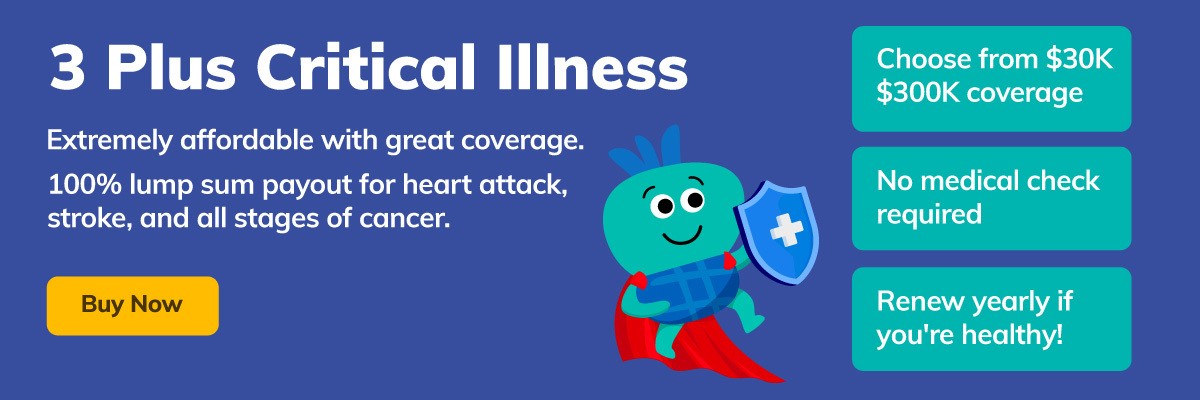The most dangerous illnesses are the ones you don’t see coming.
Key Takeaways
- The foundations of heart disease are laid early. They tend to can get worse with stress and sedentary lifestyles in our 40s.
- Regular cancer screenings are important when we enter our 40s, as early detection is a lifesaver.
- Hypertension is stealthy, but good lifestyle habits help.
- Autoimmune systems can turn against us, especially if we don’t notice the early signs.
They say your 40s is when you hit the peak, both in your career and personal life. But the stresses, and excesses of modern day living in Singapore comes with its pitfalls. In today’s hectic world, we often don’t take notice of the little changes that happen in our bodies. Before we know it, a new illness takes us by surprise and changes our lives.
It doesn’t have to be this way. All we need to do is take note of what’s happening to us. To make it easy to start, we’ve come up with a set of illnesses that commonly creep up on us, and what we can do about them.
The heart is where it’s at!
Cardiovascular diseases encompass a wide range of heart and blood vessel-related disorders, from coronary artery disease to heart rhythm problems (arrhythmias). During one’s 40s, the risk of these diseases begins to increase due to a variety of factors. Age-related changes in the heart and blood vessels, combined with accumulated exposure to risk factors such as high cholesterol, high blood pressure, smoking, and an unhealthy diet, can make individuals more susceptible.
For many, the 40s is a period of increased stress—both personal and professional—which can further strain the heart. Sedentary lifestyles, prevalent in our modern world, exacerbate the risk. Unfortunately, initial symptoms can be subtle or even non-existent, making regular screenings and check-ups vital.
Furthermore, a family history of early heart disease can elevate one’s risk. Genetics can play a role in cholesterol levels, blood pressure, and other heart-related parameters. It’s crucial to be aware of one’s family history and discuss it with healthcare professionals.
While heart attacks are more common in older individuals, the groundwork for these potentially fatal events can start much earlier. Adopting heart-healthy habits like regular exercise and eating whole foods low in fat, can provide significant protective benefits as one ages.
Hiding in plain sight
The onset of middle age, marked by the 40s, sees an uptick in the risk for various cancers. Multiple factors, including genetics, lifestyle choices, and accumulated environmental exposures, contribute to this elevated risk.
Breast cancer, for instance, becomes more prevalent among women in this age bracket. Regular mammograms, which often commence in the 40s, are essential for early detection. Prostate cancer, too, becomes a concern for men, with many medical professionals recommending initial screenings during this decade, especially if there’s a family history.
Colon cancer is another malignancy that sees increased incidence rates from the 40s onwards. Colonoscopy screenings typically begin at 50 for average-risk individuals, but those with family histories or certain genetic factors might start earlier.
This is why regular screenings are paramount for early cancer detection. Mammograms can identify breast cancer, while Pap smears screen for cervical cancer. Colonoscopies, usually starting at age 50, detect colorectal cancer, and men can discuss PSA testing for prostate cancer. Self-examinations, including breast and testicular checks, help individuals notice abnormalities. Awareness of potential cancer symptoms, such as persistent coughs or bowel habit changes, facilitates early medical consultation, enhancing the likelihood of catching malignancies in their initial stages.
Some tension is good, but hypertension isn’t.
Hypertension, often referred to as high blood pressure, is a medical condition characterized by the persistent elevation of the force of blood against arterial walls. As individuals transition into their 40s, the likelihood of confronting hypertension escalates, a culmination of various interlinked factors.
Firstly, age-related changes play a pivotal role. As we age, our blood vessels undergo a natural process of stiffening. This arterial rigidity means the heart has to work harder to pump blood, often resulting in increased blood pressure.
Lifestyle and dietary habits accumulated over decades can also be instrumental. Consuming diets high in sodium, often found in processed and fast foods, directly correlates with raised blood pressure. Excessive consumption of alcohol or caffeine can exacerbate the situation, as can prolonged periods of stress. Over time, being overweight or obese can put added strain on the heart, further elevating the risk of hypertension.
Given its stealthy character, proactive health measures become crucial. Regular medical check-ups and blood pressure monitoring are indispensable, especially in the 40s. These checks can lead to early detection, ensuring timely medical or lifestyle interventions, and ultimately safeguarding one’s overall cardiovascular health.
When the body attacks itself
Autoimmune diseases are a group of disorders wherein the immune system mistakenly attacks the body’s own cells and tissues. This aberrant immune response can be directed against various parts of the body, leading to a wide array of symptoms. As individuals venture into their 40s, they may become more susceptible or begin to notice the manifestations of these conditions more prominently.
Some of the more commonly known autoimmune diseases include rheumatoid arthritis, wherein the immune system targets the joints, causing inflammation, pain, and eventual damage. Lupus is another condition that can affect multiple organs, presenting with symptoms like fatigue, joint pain, and skin rashes. The precise cause of many autoimmune diseases remains elusive, but a combination of genetic, environmental, and hormonal factors is believed to play a role.
The onset of autoimmune conditions in one’s 40s can be influenced by several factors. Hormonal changes, especially in women approaching menopause, can potentially alter immune system functioning. Additionally, prolonged exposure to environmental triggers, like infections or certain chemicals, might finally tip the balance towards an overt autoimmune response after decades of silent predisposition.
Diagnosis in the 40s is crucial as early intervention can help manage symptoms and reduce potential damage. It’s worth noting that these diseases often present with non-specific symptoms initially, making them challenging to diagnose. Fatigue, joint pain, skin changes, or low-grade fevers might be dismissed as age-related or stress-induced when, in fact, they could be indicative of an underlying autoimmune process.
Your 40s can be less stressful
Not every illness can be predicted, but having sufficient protection if anything untoward happens is entirely possible. That’s why Tiq 3 Plus Critical Illness can be useful in protecting your loved ones and you. With highly affordable options, coverage is offered in $1000 increments, starting from $30,000 all the way up to $300,000. This critical illness plan also has an additional 20% payout of the sum insured upon diagnosis of Diabetic Complications or Severe Rheumatoid Arthritis (SRA), to help you deal with unexpected diseases
As you take life by the horns, you can be secure in the knowledge that you’re protected, whatever happens. Discover the right insurance plan to protect your family and ensure peace of mind. Learn more about Tiq 3 Plus Critical Illness today.
[End]
Information is accurate as at 15 August 2023. This policy is underwritten by Etiqa Insurance Pte. Ltd. (Company Reg. No. 201331905K).
Age means the age at next birthday.
This policy is protected under the Policy Owners’ Protection Scheme which is administered by the Singapore Deposit Insurance Corporation (SDIC). Coverage for your policy is automatic and no further action is required from you. For more information on the types of benefits that are covered under the scheme as well as the limits of coverage, where applicable, please contact us or visit the Life Insurance Association (LIA) or SDIC websites (www.lia.org.sg or www.sdic.org.sg).
You should seek advice from a financial adviser before deciding to purchase the policy. If you choose not to seek advice, you should consider if the policy is suitable for you.
As this product has no savings or investment feature, there is no cash value if the policy ends or if the policy is terminated prematurely.
This advertisement has not been reviewed by the Monetary Authority of Singapore.
Tiq by Etiqa Insurance Pte. Ltd.
A digital insurance channel that embraces changes to provide simple and convenient protection, Tiq’s mission is to make insurance transparent and accessible, inspiring you today to be prepared for life’s surprises and inevitabilities, while empowering you to “Live Unlimited” and take control of your tomorrow.
With a shared vision to change the paradigm of insurance and reshape customer experience, Etiqa created the strong foundation for Tiq. Because life never stops changing, Etiqa never stops progressing. A licensed life and general insurance company registered in the Republic of Singapore and regulated by the Monetary Authority of Singapore, Etiqa is governed by the Insurance Act and has been providing insurance solutions since 1961. It is 69% owned by Maybank, Southeast Asia’s fourth largest banking group, with more than 22 million customers in 20 countries; and 31% owned by Ageas, an international insurance group with 33 million customers across 16 countries.
Discover the full range of Tiq online insurance plans here.











